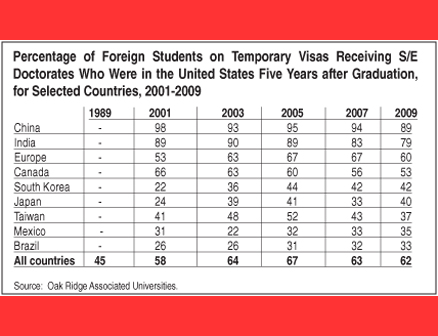 Percentage of students on temporary visas.
Percentage of students on temporary visas.
Foreign students from India and China are remaining in the U.S. after getting their doctorates here in large numbers and at much higher rates that Ph.D. graduates from other countries, according to a new study.
The study showed that the stay rate of those from China who graduated from 2005-2009 with Ph.D.s was 89 percent, “the highest observed for any country in 2009,” the study said.
“The stay rate for India in 2009, 79 percent, is also high given that none of these were permanent residents at the time of graduation,” the report pointed out (see table).
The study, “Stay Rates of Foreign Doctorate Recipients from U.S. Universities 2009,” used tax records to estimate the rate of foreign doctorate recipients from U.S. universities who remained in the U.S. after graduation.
Funded by the National Science Foundation, the report is conducted biannually by the Oak Ridge Institute for Science Education in Oak Ridge, Tenn.
“Foreign students pursuing science and engineering doctorates in the U.S. are continuing to increase, and the rates at which they remain in the country to work after graduation are at or near their highest levels,” the report said.
“Stay rates continue to vary substantially by country of citizenship, and some scholars have expressed concern that the difficulty of obtaining U.S. work visas would reduce stay rates,” explained Michael Finn, senior economist at ORISE and author of the report.
“But, paradoxically, we found that doctorate recipients from China and India, countries with among the most challenging visa processes, have had stay rates near 90 percent — much higher than all other countries combined.”
There has been concern that many foreign graduates are leaving the U.S. after graduation to set up innovative companies in their home countries due to restrictive U.S. immigration policies. Legislation is pending in Congress to approve quick visa applications for foreign graduates in the STEM fields at U.S. graduate schools.
Researcher Vivek Wadhwa, who was honored last week with an award from U.S. Citizenship and Immigration Service, has written columns in the Washington Post and Bloomberg BusinessWeek critical of U.S. immigration policies that lead to Chinese, Indian and other high degree holders to return to their home countries for greater opportunities.
Asked to comment on this new report, Wadhwa told India-West that the claims made “are idiotic.”
“This looks at five- and 10-year stay rates based on 2009 data,” the Indian American tech writer and researcher said. “In other words, it looks at people who graduated in 1999 or 2004. These people entered the U.S. 7-10 years (ago) or earlier. So this is the cohort of the late 80/early 90s. Things were much different in those days.”
“When my generation came to the U.S. — like the generation in the report — there were no opportunities back home. And it was much easier to get U.S. permanent resident visas. What I am saying is that this report bears no relevance to what is happening today when foreign students return home by default,” Wadhwa said.
The report, he added, “gives a false sense of comfort to policy-makers. There is a brain drain in progress (that) is sapping U.S. competitiveness.”
The Oak Ridge report said the stay rate for all foreign doctorate recipients, including those on permanent visas at graduation, was 64 percent for those graduating five years earlier, and 66 percent for those graduating 10 years earlier.
“Those rates are down slightly from the peak levels observed two or four years ago but still up relative to earlier periods,” the report said. “However, for the subset of those graduates who were on temporary visas when they graduated, the combined five- and 10-year stay rates in 2009 have increased significantly over the previous decade,” the study added.
Among science and engineering disciplines, the highest stay rate was recorded for life sciences as of 2009, while computer and electrical and electronic engineering ranked highest in the 2007 report. The stay rates in agricultural sciences, economics, and the other social sciences were again the lowest, according to the report.
The Oak Ridge Institute for Science and Education is a U.S. Department of Energy institute focusing on scientific initiatives to research health risks from occupational hazards, assess environmental cleanup, respond to radiation medical emergencies and support national security and emergency preparedness.
Richard Springer
5 Mar 2012



U.S. Still a Lure for Many Ph.D. Graduates from India, China
Posted on March 7, 2012